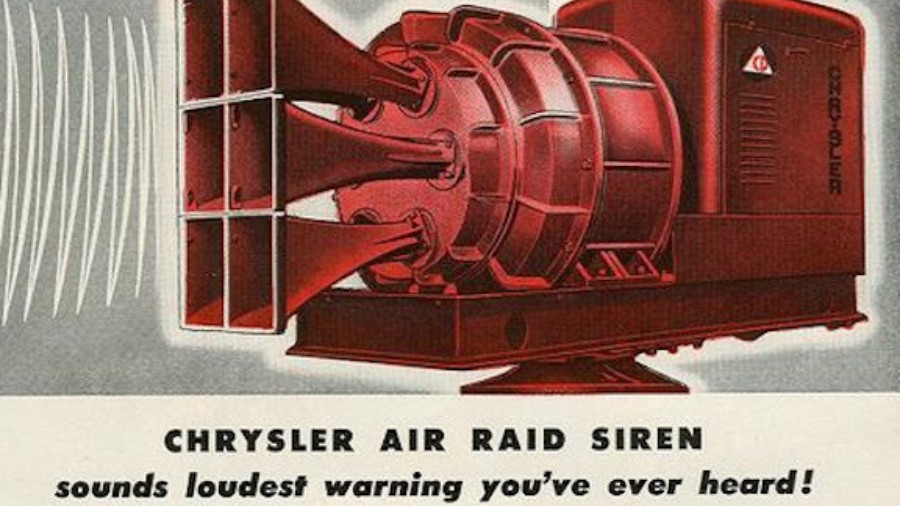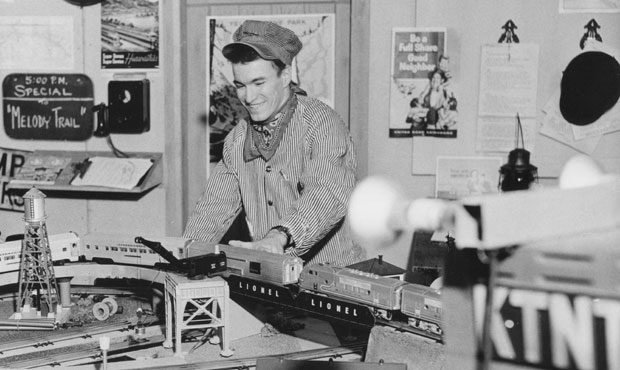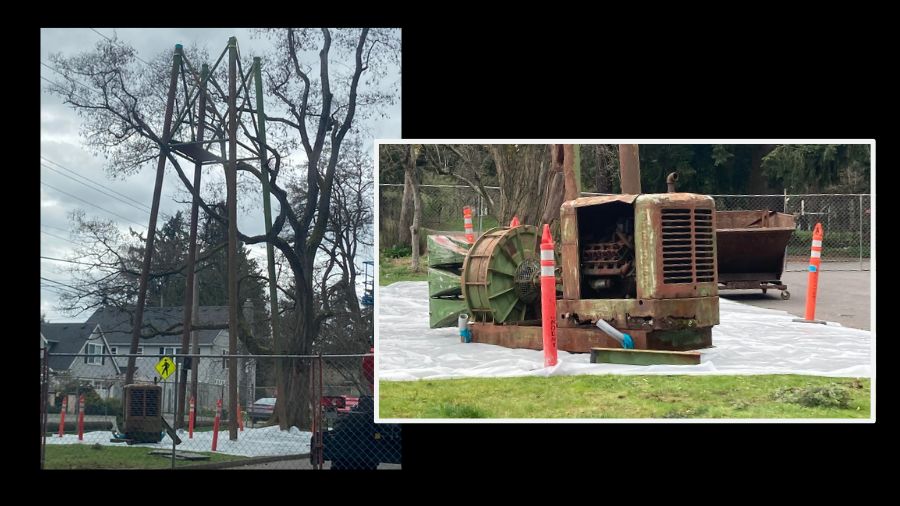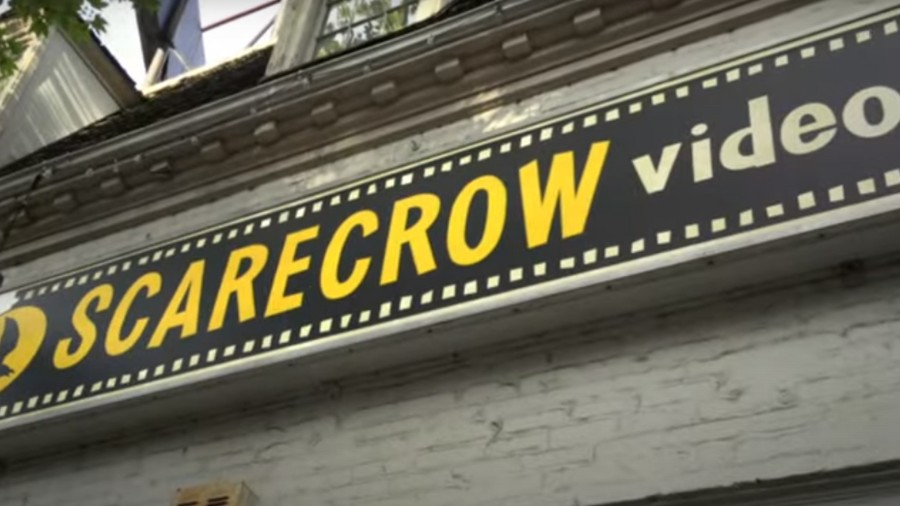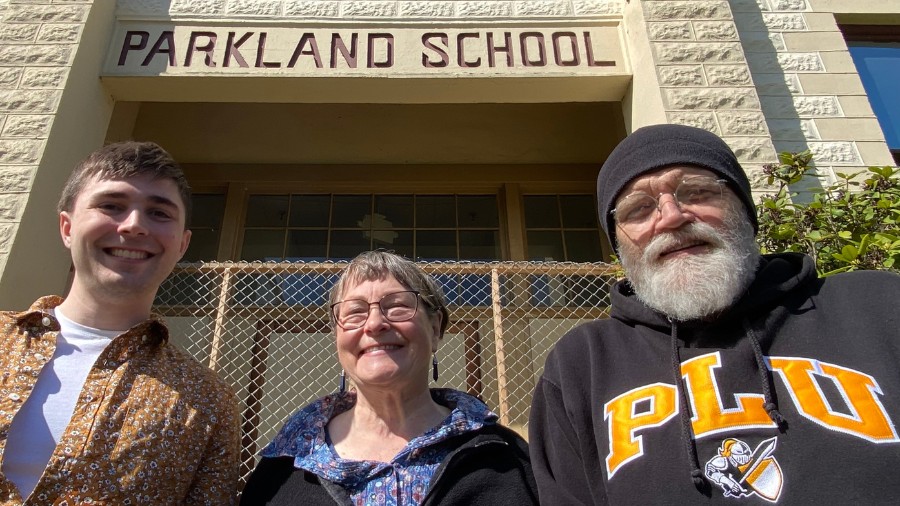Eerie parallels of baseball history in Seattle and Milwaukee
Oct 5, 2022, 9:47 AM | Updated: 11:02 am

Milwaukee waited 52 years to get a Major League Baseball team after the original Brewers left after one season in 1901; when the Braves moved there from Boston in April 1953, they were welcomed like heroes. (Milwaukee County Historical Society)
(Milwaukee County Historical Society)
With the Mariners in the playoffs for the first time in 21 years, a subset of diehard fans had hoped the Milwaukee Brewers might also make it to the post-season in 2022. The reasons are complicated, but let’s just say the Seattle-Milwaukee baseball rivalry goes way back, and the cities have a surprising number of things in common when it comes to professional sports.
Admittedly, this story evolved a bit since it first hatched last week – and it ended up with me having a lot more sympathy for baseball fans in Milwaukee than I’ve ever had before.
For a long time, some have harbored a fantasy whereby the Seattle Mariners would face the Milwaukee Brewers in the World Series – more about “why” below. Unfortunately, the Brewers – who have made the playoffs for a team-record four seasons straight – were mathematically eliminated this past Monday night.
Many people already know the first essential fact of this story: the Brewers began life as the 1969 American League expansion team called the Seattle Pilots. The Pilots were terrible, and they played in the decaying Sicks Stadium on Rainier Avenue. The voter-approved Kingdome was to be built for them eventually, but Major League Baseball was in a hurry to add expansion teams so that Kansas City could field the Royals in 1969. Their official theme song was “Go, Go You Pilots!,” penned by local sportscaster (and composer) Rod Belcher.
The Pilots went bankrupt after one season, and by the spring of 1970, go they did. Milwaukee businessman – and future baseball commissioner – Bud Selig snatched them away from Seattle just six days before Opening Day 1970 and renamed them the Brewers. There was so little time to spare, the Brewers had to adopt Seattle colors and wear Seattle uniforms with the ‘Pilots’ patches torn off.
But then, since King County voters had approved the Kingdome as part of a deal to get that baseball franchise in Seattle, Washington Attorney General Slade Gorton sued Major League Baseball and won. And that’s how Seattle got the Mariners, who debuted in 1977 – the same year as their 2022 playoffs opponent, the Toronto Blue Jays.
Now, about that World Series fantasy.
The former-Seattle-Pilots-now-Milwaukee-Brewers were an American League team in 1970, but that changed in 1998 when the Brewers moved to the National League. At that moment, it became hypothetically possible for the Mariners to face the Brewers in the World Series someday. Thus, for the franchise purists (and the radio historians who like to carry an esoteric grudge … or ten) this would mean a fall classic pitting Seattle against Seattle, the living versus the ghosts, the Mariners versus the Pilots.
I’ve always wondered if anybody else thought about this potential matchup – especially in and around the Brewers’ home turf. So, I tracked down a sportswriter in Milwaukee to test my theory.
JR Radcliffe writes for the Milwaukee Journal Sentinel. He told KIRO Newsradio that there are, indeed, a handful of significant modern baseball connections between Wisconsin and Seattle: manager Scott Servais is from LaCrosse; outfielder Jarred Kelenic is from Waukesha, and outfielder Mitch Haniger was, for a time, a minor leaguer for the Brewers.
“But other than that, those are probably the connections,” Radcliffe said. “I really don’t think many people with the Brewers think too much about the Seattle Pilots, I’m afraid.”
But Radcliffe also said there are people who obsess about Milwaukee’s baseball past and, specifically, about the Milwaukee Braves. This was going back to an earlier era and a deeper layer of history, but the Brewers-Pilots debacle all started to make much more sense.
The Braves have played in Atlanta since 1966, and just last year, they beat the Brewers in the playoffs on the way to winning the World Series. But, as some people surely know – me not included – from 1953 to 1965, the Braves were Milwaukee’s team.
Radcliffe says that in Milwaukee – nearly 60 years after they left – the Braves are still almost mythical, and he put me in touch with one of the most dedicated torchbearers of the Braves’ legacy: Bob Buege, president of the Milwaukee Braves Historical Association.
President Buege was there when the Braves arrived in Milwaukee in 1953.
“It’s hard to overstate how the fans reacted, it was just insane,” Buege told KIRO Newsradio. “I was a kid. I was not quite seven when they moved here and the city, I mean, they went crazy over this team after waiting half a century. You can imagine the reaction.
“When they arrived from spring training in ‘53, they came up through Chicago on a train and they disembarked on Wisconsin Avenue,” Buege continued. “And there was a parade set up. They had open convertibles,” Buege said. “And from that moment on, I mean, everybody in the area knew that they were in the major league.”
To hear Buege describe it, 1953 marked the beginning of an incredible era for major league baseball in Milwaukee. Of course, it should be pointed out here that the Braves’ move was no victimless crime: the team had moved from Boston, which broke some hearts in Massachusetts, but at least Beantown still had the Red Sox.
Buege says the Milwaukee Braves were good, and then they got great, fans loved them, and they broke all kinds of league attendance records, attracting more than two million people in a single season. Future Hall of Famers like Warren Spahn and Hank Aaron were on the roster, and the Braves won the World Series in 1957 and won the pennant again in 1958. It was a golden age for the fans and the team.
When Buege mentioned that Milwaukee had waited “half a century” to get a major league team, I wasn’t sure what he meant. As he explained that delay of more than 50 years, I started to develop feelings of empathy for Bob and other longtime Milwaukee baseball fans and to feel a little less bad about how Milwaukee stole the Pilots in 1970.
Buege says that in 1901, when the American League was created, Milwaukee was home to one of the original eight teams. That team was called – you guessed it – the Milwaukee Brewers.
Does this next part sound somewhat familiar?
“They were not successful financially,” Buege said. “They played in a dumpy ballpark that was nothing attractive. And so they stayed one year.”
Wait a minute? Was Bob now talking about the 1969 Seattle Pilots?
Actually, Buege was describing the inaugural season of the 1901 Milwaukee Brewers of the American League, but he could’ve been describing the Pilots. The parallels are downright eerie.
Buege says those original American League Brewers left after one season, and moved in 1902 to St. Louis and changed their name to the Browns. They eventually moved to Baltimore in 1954 and became the Orioles.
Thus, when the Braves arrived at that heroes’ welcome and parade in 1953, Milwaukee had been waiting for an incredible 52 years to get a Major League Baseball team back in Wisconsin. In comparison, Seattle only had to wait seven years for the Mariners after the Pilots left – though, for NBA fans, it’s been 14 years and counting since the Sonics decamped for Oklahoma City.
Oddly enough, with the Braves, Milwaukee had only about a decade-long love affair with the team before it all went sour. The Braves weren’t terrible – they never had a losing season in Milwaukee – but a new owner from Chicago named William Bartholomay took over in 1962. He and his investors started shopping around for a better deal in a bigger TV market. Atlanta was on the rise and built a new stadium, and, says Buege, had the backing of Atlanta-based Coca-Cola. Before too long, they got themselves the baseball version of the Real Thing.
“It was very bitter the last year that they were here,” Buege said about the Braves’ final chapter in Milwaukee. “They wanted to move to Atlanta in time for the 1965 season, and they were stopped because they had a lease on [Milwaukee] County Stadium that they had to fulfill.
“So they had one year as a lame-duck team, and their attendance was just over half a million,” Buege continued. “So it was about a fifth of what it had been at its peak.”
By 1966, Milwaukee baseball fans were heartbroken. You could almost say they had been ‘Clay Bennett-ed’ – had their team sold out from under them to an out-of-towner who then moved them away. But that’s when Milwaukee businessman Bud Selig – who was only in his early 30s at that point – started doing what might be called ‘Chris Hansen-ing’ – looking for a wounded or weakened team to buy and bring home to hungry fans.
With the Pilots’ problems in 1969 and ultimate bankruptcy, they were ripe for the picking, and Bud Selig was the guy to do it, says Buege.
“Bud Selig is the champion of the current Brewers,” Buege said. “I mean, [he’s the] former owner and so forth, but he worked tirelessly – I sound like a PR man for him – but he really did.”
But even a new major league team wasn’t enough to heal Buege’s wounds.
Buege says he was so disillusioned by the departure of the Braves, that he didn’t even go to a Milwaukee Brewers game until their second season in 1971. And he said those first several years of crummy Brewers baseball were heartbreaking for anyone who had been around for the glory years of the Milwaukee Braves.
“The first year the Brewers were here, I didn’t go to any [games],” Buege said. “That’s kind of a measure of how much it bothered me – and you didn’t have trouble getting tickets because they didn’t sell many in those days.
“It was just such a painful thing to anybody who had experienced the Milwaukee Braves to watch the Milwaukee Brewers and see how big a difference there was,” Buege continued. “I mean, one was just this really powerful team with these great players, future Hall of Famers. And then you look at the Brewers, and you know Bud Selig is trying to sell a product that he knows is just inferior.
“You know, it just wasn’t the same,” Buege said.
But Buege eventually came around to being a Brewers fan, and he particularly appreciates the Wall of Honor that was installed at the Brewers’ ballpark in 2004. Each year, he helps select a new player to add to the list of those enshrined at Milwaukee’s home to Major League Baseball, helping connect the golden age of the Braves to the Brewers’ current efforts.
If the experiences of Bob Buege and other Milwaukee fans – and any Seattle fans, for that matter – are typical, it should be clear by now that baseball history rhymes, repeats, and always eventually breaks your heart.
So then, I say ‘go Mariners,’ but just don’t ‘go’ like the Pilots. And in the meantime, maybe I’ll next see if I can change my feelings toward Oklahoma City.
You can hear Feliks every Wednesday and Friday morning on Seattle’s Morning News with Dave Ross and Colleen O’Brien, read more from him here, and subscribe to The Resident Historian Podcast here. If you have a story idea or questions, please email Feliks here.


